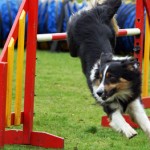Mental Management® Coach, Heather Sumlin
Mental Management® Coach Heather Sumlin takes a moment to answer some questions about her journey and share some personal challenges. She has been coaching since 2010 and plans to offer some specific help for agility and dog sport competitors in the coming months. Read the interview below as she offers insight on making your mental training just as important as your obstacle training.
Interview Questions & Answers
What drew you to become a Mental Management® coach ?
I started working for Mental Management® Systems in 2003. My parents, Lanny & Helen Bassham, had been running the company on their own since 1977. I was originally brought on board to help with customer relations, sales and marketing. Coaching wasn’t initially part of my job description. In an effort to give back Mental Management® sponsored a local pageant in 2006 (I used to compete and had been a director in the past so this was a natural fit for me). The sponsorship allowed me the opportunity to train a handful of titleholders during their preparation for Miss Texas and Miss Texas Outstanding Teen. One of the girls, Shilah Phillips, won Miss Texas that year (on her first attempt) and all of the girls did very well. It was exciting to see how Mental Management® could be translated to stage performance. During that year I learned my true passion is connecting with people, mentoring and teaching. Doors began to open and I started coaching as part of my responsibilities. Each year I have grown in my ability to teach students in a variety of different sports/performance areas. It is a wonderful way to give back to others and I feel blessed to have the opportunity. I have been coaching dog handlers since 2010 and I love it.
For those that haven’t read the book, With Winning in Mind by Lanny Bassham, can you define the Mental Management® program in a nutshell?
The book “With Winning in Mind” breaks down the Mental Management® System and helps the reader apply it to competition and life. Lanny Bassham developed this program and used it to win World and Olympic Championship titles. For over 35 years he has been teaching his system to others in sport, business and performance. Our system focuses on the three mental processes that control performance; Conscious Mind (thoughts), Subconscious Mind (skills), and the Self-Image (habits and attitudes). When these mental processes are in balance good performance seems easy. The definition of Mental Management® is “the process of improving the probability of having a consistent mental performance under pressure on demand.” Our goal is to help our clients compete in balance to reach their potential under pressure.
With other programs out there, what would you say sets the MM program apart from others?
The founder, Lanny Bassham, created our system and used it to win at the elite level in his sport. He studied and interviewed Olympic champions to find out what they were doing differently mentally. The system was developed based on the information he gained. We have multiple World and Olympic Champions who have used our system under pressure with success and have worked with a wide variety of athletes, business professionals and performers. This certainly sets us apart. We are also a family owned and operated business. I work alongside my father, mother, brothers, niece and son on a daily basis.
What are some personal challenges you have faced that Mental Management® has helped you deal with?
Several years before working for my parents I was a single mother with a negative attitude and very few dollars to my name. My environment was controlling my attitude on a consistent basis and I was allowing it. I read “With Winning in Mind” because I wanted to change my environment literally. I wanted to move away and had a job interview lined up in another state. My plan was to take my child away from the only grandparents he knew and move 1,000 miles away in order to leave what I perceived to be a bad environment. On the plane ride to my interview I read “With Winning in Mind” with hopes of finding some advice to help me with my confidence for my interview. Instead I found a different type of wisdom. As the plane touched down I realized my perspective needed adjusting, my Self-Image needed to grow and my environment was not the problem, my attitude was the issue. I turned down the job offer, changed my attitude and redefined my world by thinking differently. I learned how to think better, give more, and complain less which lead to promotions and a dramatic change in income. Ultimately it was this experience which lead me to work for my parents. I had sat in my dad’s classes before and skimmed over his book but I had never truly tried to apply his system to myself until I that plane flight which changed my life for the better.
As a coach, what do you find most rewarding about your job?
I enjoy solving problems and I love being there when someone reaches a personal goal. Seeing a light bulb go off as we talk or hearing them say “I never looked at it that way, thank you so much for your help” is what I love most. Receiving thank you notes, text messages, emails and phone calls from clients who are taking on their dreams full force and have reached new levels of confidence in their abilities is a blessing. I am a small part of their success and I am so thankful when they reach out and send me a note of thanks.
What would you consider your biggest achievement with a client in your career to date?
To single out one client would be almost impossible, every client is special to me and I have moments of joy with each person I work with. The most important client to me is the one sitting in front of me at the time (or on the phone with me). I have had clients who have made world teams, competed at the national or international level in a variety of sports but those achievements do not belong to me. I enjoy the opportunity to present Mental Management® techniques to those who need it and sometimes the achievements which mean the most are the little ones along the way. There have been several moments when a client will shed a tear or two when they open up about their fears or set backs. When those fears and tears turn into victories and joy because they learn how to change their thinking and become the person they aspire to be is truly rewarding.
What would you say is the most important FIRST step towards implementing and effective Mental Management® program?
Making the decision to make the mental game a priority is your first step. Your mental game will not change unless you choose to make it possible by changing habits and implementing new strategies. The next step is to obtain an understanding of the Mental Management® through products and/or training. The best products for agility handlers are:
- What Every Dog Agility Competitor Should Know First About the Mental Game – Audio (we have a version for Obedience and Freestyle as well),
- “With Winning in Mind” Book or Audio
- “Freedom Flight – The Origins of Mental Power” Book or Audio
- “Attainment – The 12 Elements of Elite Performance” Book or Audio
- and The Performance Analysis Journal.
You can always call our office and talk with someone directly about products and training – 972-899-9640.
What do you find is the most common challenge competitors and specifically, dog agility competitors face?
It depends on the handler because the needs vary tremendously but probably the most common question I am asked is how to handle negative people and/or negativity after a run. Agility is a very social sport and there is a lot of interaction between participants. In most cases the intentions are very good and the information is meant to be helpful, however, sometimes the delivery of information or timing can be harmful to Self-Image growth or the information is misunderstood. We need to be intentional in how we talk to ourselves and to others and choose to build instead of tear down others by our words and actions. We also need to filter our response by determining what is meant by the comments instead of reacting to what is said. Take what is helpful and use it to improve, let go of harmful thoughts and comments and move quickly toward improving thoughts regarding the environment, the run and others.
It seems that dog agility is quite different from other sports in several aspects. Can you outline those differences and how they can be managed?
This could be an article by itself so I will only focus on the 3 areas which jump out to me.
The first obvious difference is your teammate is a four legged variable who does not speak english and has a mind of their own. The health and well being of your animal is extremely important because they are more of a family member than a teammate. This presents several potential challenges. You need to understand your teammate and how they respond to your mood. You need to learn how to control your nerves in competition because your teammate will respond according to your behavior and/or change in behavior.
People share freely in this sport – they give advice on Facebook, post about things they learn, and do their best to help others. To me that is a tremendous benefit to this sport. There is always something to learn and handlers are eager to gain the knowledge needed to improve and often are quick to give feedback to others. Sometimes the feedback may not be delivered in the best way or at the best time so learn how to control your attitude and mindset no matter your environment.
Agility is a great revealer of personal growth opportunities honestly. There appears to be a large percentage of participants who did not compete in sports growing up which leads to new opportunities to grow in a variety of areas outside of the ring as well as technically. There could be a temptation to focus on what other people think so building Self-Image/Confidence is vital to being in control during competition. Be aware and open to changing more than your technical skill in order to reach your potential. Fitness, mental toughness, social awareness, communication skills, team work are all areas I have helped handlers work on mentally over the years in order to be the best they can be in and out of the ring.
How do competitors keep up the enthusiasm from when they first learn Mental Management® into the coming years of training and competitions.
I don’t know that you have to be enthusiastic as much as you need to be intentional and consistent. Each person will have their own struggles and trials (no pun intended) on their way to their goals. It is the person who handles those opportunities with intentional direction and focus who reach their potential quickest. Having Mental Management® as a tool to use in competition, preparation and daily life can truly help you reach goals in and out of the ring. The system doesn’t change but your depth in understanding will change as you use it. In the beginning people will only truly learn what they need to know to get started. As their goals advance so should their understanding of how to use the system in pressure situations.
What can we expect to see from Heather Sumlin in the near future?
I have started a Mental Management® Dog Handler Newsletter which goes out every 4 to 6 weeks. Email me to join that newsletter (heather@mentalmanagement.com) The second issue will be sent out soon. I plan to use the questions which come in from readers as a guide for what products and training is most needed for agility and other dog sports.
I will be heading to New Jersey on January 23rd for a handler seminar. I am hopeful to offer more seminars next year if there is interest. I will be doing a seminar in our offices in Flower Mound, TX specifically for dog handlers, I am looking for a date in 2016 and will promote that in the newsletter.
[lgc_column grid=”50″ tablet_grid=”50″ mobile_grid=”100″ last=”false”]
700 Parker Square, Ste. 140
Flower Mound, TX 75028
972-899-9640
[/lgc_column][lgc_column grid=”50″ tablet_grid=”50″ mobile_grid=”100″ last=”true”]heather@mentalmanagement.com
www.mentalmanagement.com
www.mentalmanagementstore.com[/lgc_column]




